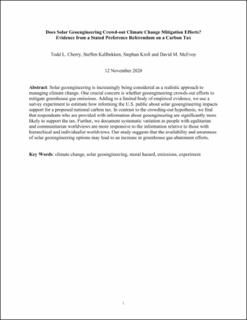Does solar geoengineering crowd-out climate change mitigation efforts? Evidence from a stated preference referendum on a carbon tax
Peer reviewed, Journal article
Submitted version

Åpne
Permanent lenke
https://hdl.handle.net/11250/2976025Utgivelsesdato
2021Metadata
Vis full innførselSamlinger
- Journal articles [478]
Originalversjon
10.1007/s10584-021-03009-zSammendrag
Solar geoengineering is increasingly being considered a realistic approach to managing climate change. One crucial concern is whether geoengineering crowds out efforts to mitigate greenhouse gas emissions. Adding to a limited body of empirical evidence, we use a survey experiment to estimate how informing the U.S. public about solar geoengineering impacts support for a proposed national carbon tax. In contrast to the crowding-out hypothesis, we find that respondents who are provided with information about geoengineering are significantly more likely to support the tax. Further, we document systematic variation as people with egalitarian and communitarian worldviews are more responsive to the information relative to those with hierarchical and individualist worldviews. Our study suggests that the availability and awareness of solar geoengineering options may lead to an increase in greenhouse gas abatement efforts.